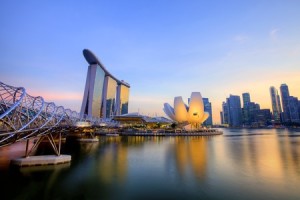
The funds will see Singapore draw up its national reserves to help businesses, specifically for the aviation, hospitality, tourism and commercial sectors to cope with the challenges posed by the Covid-19 pandemic.
In a bid to help businesses cope with the challenges posed by the Covid-19 pandemic, Deputy Prime Minister Heng Swee Keat announced in Parliament on 26 March that the government will set aside $20 billion worth of loan capitals for companies, increase property tax rebates and defer payments of corporate income tax for three months, reported TODAY Online.
As part of the $48 billion Resilience Package, the funds will see Singapore draw up its national reserves to help businesses, specifically for the aviation, hospitality, tourism and commercial sectors.
For instance, the tourism and hospitality sector, which include hotels, exhibition centres, and serviced apartments, will see a 100% tax rebate instead of the previously announced 30%, while the premises at Changi Airport, Marina Bay Cruise Centre, Singapore Cruise Centre, and Tanah Merah Ferry Terminal, will also enjoy a 100% rebate instead of 15%.
Other commercial properties such as retail shops, sports and recreation operators, food-and-beverage outlets, schools and childcare centres, workers’ dormitory, tourist attractions as well as healthcare-related facilities, on the other hand, will see a property tax rebate increase of 100% from 15%.
As for integrated resorts, Marina Bay and Sentosa’s property tax rebate will be raised from 10% to 60%, while non-residential properties such as offices and industrial properties which did not get any rebate in the initial budget statement will have 30% property tax rebate under the latest package.
The government, for its part, will “lead by example” and boost rental waivers for tenants leasing government-managed properties.
For instance, stallholders at hawker centres managed by the National Environment Agency will enjoy three months of rental waiver, instead of the one-month waiver initially announced.
As for other government-managed properties, such as those ran by the Housing and Development Board and the National Arts Council, they will get two months of rental waiver, instead of half-month.
All other non-residential tenants will have their rents waived for half-month. Such rental waivers will cost $334 million in total.
Additionally, all government fees and charges will be suspended for one year, from 1 April to 31 March 2021.
Thus, Heng strongly urges the private sector to “fully pass on the rebate to tenants, by reducing rentals, to directly ease the cash flow and cost pressures faced by tenants”.
“Do your part, chip in, and give additional help to tenants who are more badly hit,” he said.
Apart from property tax rebates, the Resilience Package also includes enhanced financing schemes so that even “the hardest-hit businesses” can remain accessing credit.
Aside from setting aside $20 billion in loan capital, the loan amount for the trade loan under the Enterprise Financing Scheme will also rise from $5 million to $10 million. The Government will shoulder a big chunk of the risk for such loans, with its risk share up to 80% from 70%.
Businesses for loan insurance premiums under the Loan Insurance Scheme will likewise see subsidies increase from 50% to 80%.
Moreover, the government will expand the temporary bridging loan programme for the tourism sector to all enterprises and increase the maximum supported loan from $1 million to $5 million.
Interest rates will remain capped at 5% while the government bears 80% of the loan’s risk.
For small- and medium-sized enterprises under the Enterprise Financing Scheme, the maximum loan amount for working capital will increase from $600,000 to $1 million.
The government likewise assured that it is working with banks and other financial institutions for the postponement of capital payments for one year on the working capital loan and the temporary bridging loan, should businesses request.
Heng revealed that the Monetary Authority of Singapore is also working with insurers and banks to explore on how to best help businesses and individuals facing cash flow difficulties with their insurance premium payments and loan obligations.
As part of the package, income tax will likewise be deferred for companies and self-employed individuals for three months without having to file any application for deferment of payment.
Tricia Song, Head of Research for Singapore at Colliers International, noted that the property tax rebates, alongside the deferment of income tax and various jobs support schemes “will go some way to help improve companies’ cash flow and hopefully see them tide through this challenging time”.
“Taken together, we believe the measures will help to buttress Singapore’s economy amid this mighty storm that is the COVID-19 pandemic.”
The second stimulus package will bring the government’s COVID-19-related relief measures to about $55 billion, accounting for 11% of gross domestic product, shared Song.
Looking for a property in Singapore? Visit PropertyGuru’s Listings, Project Reviews and Guides.
Victor Kang, Digital Content Specialist at PropertyGuru, edited this story. To contact him about this or other stories, email victorkang@propertyguru.com.sg
Related Articles:
COVID-19 not to have a “knock-out punch” effect on hospitality sector
COVID-19 impact on Singapore REITs may be worse than financial crisis